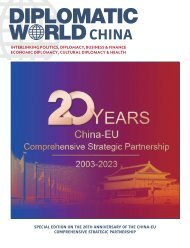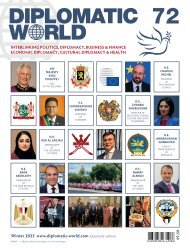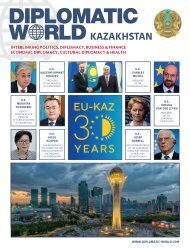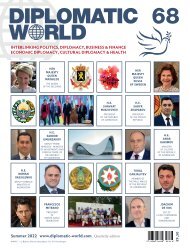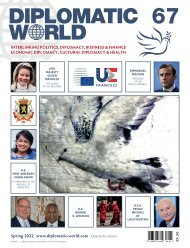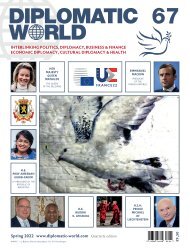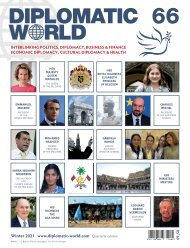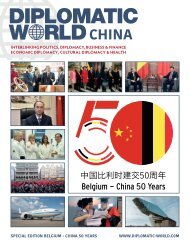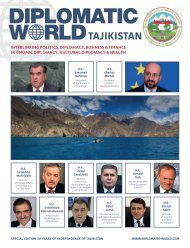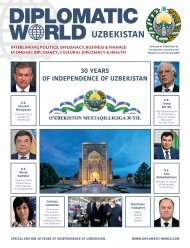Diplomatic World_69
Create successful ePaper yourself
Turn your PDF publications into a flip-book with our unique Google optimized e-Paper software.
period from 2020 to 2030 as the International Decade for Action<br />
to deliver the Global Goals,<br />
Emphasizing that the Second Dushanbe Water Decade Conference<br />
supports the effective preparation of the UN 2023 Water<br />
Conference co-hosted by the Governments of Tajikistan and the<br />
Netherlands to be held in New York,<br />
practices, in particular scaling up a culture of hand hygiene in<br />
all settings, to serve as essential barriers to the transmission of<br />
pathogens from a OneHealth perspective, and establishing effective<br />
systems of drinking-water and wastewater surveillance;<br />
B. Recognizing the importance of water for livelihoods, equity,<br />
inclusive economic growth and sustainable development<br />
SECOND HIGH-LEVEL<br />
INTERNATIONAL CONFERENCE<br />
ON THE INTERNATIONAL DECADE FOR ACTION<br />
“WATER FOR SUSTAINABLE DEVELOPMENT”<br />
2018-2028<br />
DUSHANBE - TAJIKISTAN<br />
We, the Heads of Delegation, high-level representatives of the<br />
states, organizations, major groups and other stakeholders having<br />
met in Dushanbe, Tajikistan, from 6 to 9 June 2022, contributing<br />
to the Dushanbe Water Process in our different roles and<br />
responsibilities,<br />
Reaffirming our commitment to pursue the Sustainable Development<br />
Goals (SDGs) and the vital role of water in achieving all<br />
SDGs,<br />
Recognizing water as essential for resilient and sustainable<br />
development, the eradication of poverty and hunger, health,<br />
combating desertification and biodiversity loss and to promote a<br />
socially, economically and environmentally sustainable, resilient,<br />
equitable, peaceful and inclusive future, as we navigate the present<br />
and aftermath of the COVID-19 crisis, including for the empowerment<br />
of women and indigenous peoples and the prosperity<br />
of children and youth, as well as for persons with disabilities and<br />
those in vulnerable situations,<br />
Acknowledging that water, sanitation, health, ecosystems, ocean,<br />
energy, food systems and nutrition are interlinked and that the<br />
Final Declaration<br />
from Dushanbe 2022 to New York 2023<br />
rising trend of losses caused by water-related disasters, such as<br />
droughts, floods, cyclones, flash floods, coastal surge, sea level<br />
rise, salinity intrusion, mudslides and avalanches, including from<br />
changing climate patterns and extreme weather events, must<br />
be reversed, paying particular attention to people in vulnerable<br />
situations;<br />
Emphasizing that climate change affects the world’s water in<br />
complex ways, including through water scarcity, and noting the<br />
Water and Climate Coalition Leaders’ call recognizing the role of<br />
water for informed decision-making in climate change mitigation<br />
and adaptation action, as well as the Action Plan on Hydrology,<br />
adopted by the WMO, and the Ninth Phase of the Intergovernmental<br />
Hydrological Program of UNESCO “Science for a<br />
Water-Secure <strong>World</strong> in a Changing Environment”,<br />
Recognizing the United Nations General Assembly Resolution<br />
proclaiming the period from 2018 to 2028 as the International<br />
Decade for Action “Water for Sustainable Development”, the<br />
Resolutions specifying the process for the midterm comprehensive<br />
review of the Decade and describing modalities and<br />
expectations of the United Nations Conference on the Midterm<br />
Review of the Water Action Decade in March 2023 (further the<br />
UN 2023 Water Conference) and the Resolution proclaiming the<br />
Noting the outcomes of the First Dushanbe Water Decade<br />
Conference in 2018, the President of the General Assembly’s<br />
High-Level Meeting, the High-Level Political Forum, the Bonn<br />
Water Dialogues for Results, the 9th <strong>World</strong> Water Forum in<br />
Dakar, the 4th Asia-Pacific Water Summit in Kumamoto and the<br />
meetings organized by other Member States, as well as looking<br />
forward to the contribution from the upcoming High-Level Symposium<br />
on Water during the United Nations Ocean Conference in<br />
Lisbon, of the other events mentioned in Resolution 75/212 of 29<br />
December 2020, COP-27 and of other relevant events,<br />
HEREBY REITERATE OUR DETERMINATION TO<br />
ACHIEVE THE OBJECTIVES OF THE WATER AC-<br />
TION DECADE AND DECLARE OUR COMMITMENT<br />
TO THE FOLLOWING ACTIONS, ACCORDING TO<br />
OUR RESPECTIVE CAPABILITIES:<br />
A. Ensuring universal and equitable access to safe and affordable<br />
drinking water and sanitation, including relevant services, and<br />
hygiene for all, as essential for human development and health<br />
Prioritize universal and equitable access to safe and affordable<br />
drinking water and adequate and equitable sanitation and<br />
hygiene as critical for the progressive realization of the human<br />
rights to safe drinking water and sanitation, as reflected in United<br />
Nations General Assembly Resolutions4 and to adequate food5;<br />
Support robust institutions, policies, regulations, sufficient investments,<br />
human resources and tailored approaches to deliver<br />
improved water, sanitation and hygiene (WASH) services, with<br />
immediate attention to expanding access to WASH services in<br />
underserved communities, as far as possible, including refugees,<br />
hard-to-reach and rural areas, areas experiencing natural disasters<br />
and armed conflict, following the principle of “leaving no one<br />
behind”;<br />
Prioritize access to safe and sustainable water, sanitation and<br />
hygiene, including relevant services, in all schools, childcare and<br />
healthcare facilities as vital for child, maternal and patient health<br />
and staff well-being;<br />
Build longer-term strategies for increasing pandemic prevention,<br />
preparedness and response, including the COVID-19 crisis, by<br />
investing in water supply and sanitation infrastructure, wastewater<br />
and waste management, consistently promoting good WASH<br />
Strive for transformative water policy based on a better understanding<br />
and valuing of water by promoting transparent<br />
cross-sectoral cooperation and management, through institutions<br />
and investments in environmentally sustainable and<br />
climate-resilient infrastructure, information, data, water accounting,<br />
education, training, capacity development, research<br />
and innovation, particularly in the context of moving towards a<br />
circular economy;<br />
Promote robust institutions, policies, regulations, sufficient<br />
investments, human resources and tailored approaches for the<br />
implementation of Integrated Water Resource Management<br />
(IWRM) and Disaster Risk Reduction (DRR) at all levels, as a<br />
process to ensure more equitable, efficient, sustainable and resilient<br />
management and use of water, land and related resources<br />
and protection at the basin and aquifer level from source to sea,<br />
without compromising the sustainability of life-support systems,<br />
aiming at a sound water cycle management;<br />
Strengthen trans-boundary and regional cooperation and sustainable<br />
water management including disaster risk reduction<br />
through suitable institutional, technical and economic arrangements,<br />
which may include promoting and establishing arrangements,<br />
agreements, adequate funding and financing mechanisms,<br />
at different levels, means of sharing data on water flows<br />
and exchanging information on water-related development plans<br />
in a timely manner to build confidence and trust among riparian<br />
countries, as appropriate;<br />
Promote the Water-Energy-Food-Ecosystem Nexus approach<br />
taking into account the cascading and cross-sectoral impact of<br />
stresses and shocks at all levels, including COVID-19, armed<br />
conflict, disruption of economic ties and supply chains, climate<br />
change, natural disasters and unsustainable production and consumption<br />
practices, on the increasingly integrated water, energy<br />
and food sectors and possible implications to meet basic needs,<br />
for economies and for communities;<br />
C. Building synergies between water, environment and climate<br />
change and disaster risk reduction<br />
Develop and implement resilient institutions and policies,<br />
including national adaptation plans and measures, as well as<br />
infrastructure, technologies and management approaches at the<br />
appropriate level of government and service providers, improving<br />
70 71






